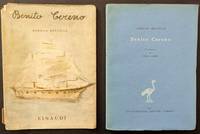1871 · New York
by (Allen, William Francis, Charles Pickard Ware and Lucy McKin Garrison, Editors)
New York: John Ross & Co. (Nation Press), 1871. 8vo. 225 x 140 mm., [9 x 5 ½ inches]. xliv, 115 pp., with the half-title. Bound in original purple cloth , title in gilt on front board; binding faded, front hinge cracked, yet sound; paper stock showing some browning in the outer margins. Signature of Theo F. Seward on title-page.
First edition; this copy with the printed paper imprint of John Ross pasted over the original imprint of Simpson & Co. on the title-page. This historic collection was the first collection of slave songs to appear in print and was compiled by white northerners who live among the ex-slaves in the Sea Islands off the coast of South Carolina and Georgia as teachers and missionaries. The 38 page preface offers valuable insight into performance practice, voice quality, song types, the shout, and other aspects of slave songs. The detailed Table of Contents indicates the geographical sources of the songs and the names of the contributors; notes are attached to many of the songs.
The editors include William Allen, professor of ancient languages at the University of Wisconsin. He was a contributor to the North American Review, the Nation, and edited a series of school books for children. Charles Pickard Ware was the superintendent of the freeman on plantations at Port Royal and transcribed many slave song with tunes and lyrics. Lucy McKim Garrison who as “a pianist and teacher had little importance, but she was well trained and sensitive, the only practicing musician among the Northerners who collected slave songs in the Sea Islands during the Civil War.” She was the niece of William Lloyd Garrison and was educated in New Jersey with the Grimke sisters where she learned the violin and piano.
This copy belonged to Theo. F. Seward, a musical educator, composer, and editor of many of the musical publications in New York City. He took charge of the Fisk Jubilee Singers and wrote down more than one hundred of the plantation melodies.
Samuel Allibone. Critical Dictionary of English Literature and British and American Authors, Supplement I, p. 135. Notable American Women II, p. 23-24. Library Company, Negro History Catalogue no. 129. Joseph Sabin, Bibliotheca Americana: A Dictionary of Books Relating to America, 82067. (Inventory #: 1346)
First edition; this copy with the printed paper imprint of John Ross pasted over the original imprint of Simpson & Co. on the title-page. This historic collection was the first collection of slave songs to appear in print and was compiled by white northerners who live among the ex-slaves in the Sea Islands off the coast of South Carolina and Georgia as teachers and missionaries. The 38 page preface offers valuable insight into performance practice, voice quality, song types, the shout, and other aspects of slave songs. The detailed Table of Contents indicates the geographical sources of the songs and the names of the contributors; notes are attached to many of the songs.
The editors include William Allen, professor of ancient languages at the University of Wisconsin. He was a contributor to the North American Review, the Nation, and edited a series of school books for children. Charles Pickard Ware was the superintendent of the freeman on plantations at Port Royal and transcribed many slave song with tunes and lyrics. Lucy McKim Garrison who as “a pianist and teacher had little importance, but she was well trained and sensitive, the only practicing musician among the Northerners who collected slave songs in the Sea Islands during the Civil War.” She was the niece of William Lloyd Garrison and was educated in New Jersey with the Grimke sisters where she learned the violin and piano.
This copy belonged to Theo. F. Seward, a musical educator, composer, and editor of many of the musical publications in New York City. He took charge of the Fisk Jubilee Singers and wrote down more than one hundred of the plantation melodies.
Samuel Allibone. Critical Dictionary of English Literature and British and American Authors, Supplement I, p. 135. Notable American Women II, p. 23-24. Library Company, Negro History Catalogue no. 129. Joseph Sabin, Bibliotheca Americana: A Dictionary of Books Relating to America, 82067. (Inventory #: 1346)





